Li Wake - Chinese Artist Extravagância - Part 2
Childhood influences make the artist in the man ...
Continued from: Li Wake - Chinese Artist Extravagância - Part 1:
en français, cliquez ici
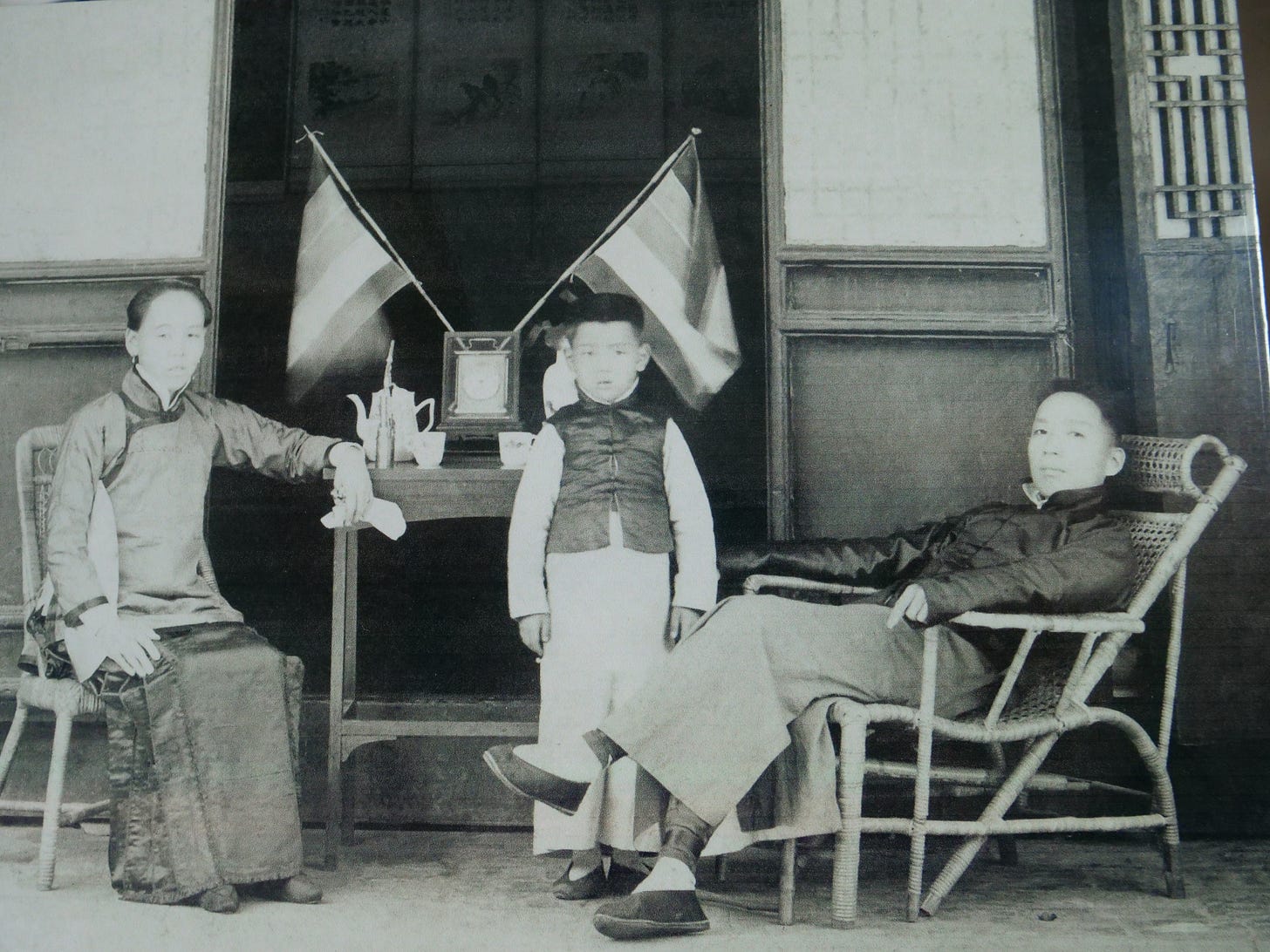
Part 2 looks at Li Wake’s early life, growing up in a changing China
How much are artists influenced by childhood and environment?
Wake is asked by his partner Bai,
“Why are you still passionate about life and continue to create? You were beaten by your father when you were a child. You ran to the Gobi Desert alone at night, crying and missing your grandma. You finally ran away to find her. For a 12 or 13 year old child, it is a long journey from Jiayuguan to Jinan. (1,995.7 km.) In your life you encountered childhood misfortunes, failed marriages, and your works were plagiarised.” Wake thinks for a moment: I don't know why, maybe it is instinct, and it is also related to my grandma's influence on me.
Wake Li was born in Zhangye, 1957,
Jiayuguan Province, a small town in Northwest China. His parents relocated to the Northwest from Qingdao to help with the construction of the town. Bordering Inner Mongolia to the north and Qinghai to the south, it’s considered one of the most important outposts of Western China, with some of the most speculator scenery. Dad went first, and mother went a year later. When the train drove into Gansu Province, looking at the vast desert, Mama couldn't help crying. She had no choice.
Wake stayed on with his grandparents
but grew wild, remembering endless beatings and countless fights with other kids: his first memory was stealing some money to buy a basketball. Uncle and Grandfather beat him from one side of the room to the other. Wake was finally sent to Jiayuguan at 11 years old. It was at this point his grandmother became paralysed.
Wake's parents often quarrelled
WAKE: Father scolded mother for being a capitalist, mother scolded father as a landlord. Dad was a very strict and stingy person … When money was not enough, mom asked dad for money. There was no doubt that there would always be a storm.
Wake remembers one particular cold winter’s night when his parents fought over money. Dad took the bamboo pole and beat us five children out of the bed. Mom could only take her five dishevelled children to her work office in the middle of the night. We slept on the table all night. Holding a bamboo stick, dad often taught me maths. I hardly answered his questions correctly because of fear of being hit. I even tied a sandbag on my hip to prevent being beaten. After school every day, we had to pick up a basket of coal nuclei (A piece of coal that was not fully burned) to use as fuel for cooking. My older brother and younger brother united to bully me, since I didn't grow up with them. I felt very isolated and lonley. I felt that no one loved me. It made me feel worse and rebellious.
By the time Wake was 13, life was unbearable.
WAKE: I escaped from Jiayuguan when I was 13 years old. I was going to Jinan to find my grandmother! This was a three-day and three-night journey. I had no money to buy train tickets. I crawled under the seat due to my small size to avoid the ticket inspector with the help of passengers. Later, the ticket inspector found that I had not bought a ticket and insisted on driving me off the train. Thanks to the persuasion of other passengers I stayed. The food stamps I brought ran out unfortunately, I couldn't buy anything to eat, I had to beg from others…I finally arrived in Jinan.
Wake was not allowed to go to school due to the fact his father’s family were considered unworthy landowners. I dropped out of school. I took care of my grandmother and I got a temporary job at 14. The job was to chop bamboo into strips to make sorbet. It was common for hands to be pierced by bamboo.
Grandma - mother’s mother 姥姥 Wake’s Memory
WAKE: My grandma took the role of mother. I lived with her at different times. She loved me very much. After school every day I could see my grandmother standing on the balcony on the second floor watching and waiting for me to come home for dinner. I was so naughty and grandfather often complained to my second uncle (the second son of his grandfather's younger brother)*. I ran out alone, so my grandmother also ran out to find me everywhere, calling my name, I hid in the dark shadow alone, crying, and could not come out.
*Family hierarchy is very important in Chinese culture. Maternal vs. paternal lineage, relative’s ages, married vs. blood all need to be considered. The term “cousin” can be split eight different ways based on mom’s side vs. dad’s side, gender, and relative age! (Jinna Wang. Tutoring Mandarin)
Grandma was our role model in our big feudal family. This big family was deeply influenced by Confucianism, where men were superior to women. When a woman marries into such a family, she is more like a servant, with infinite giving and dedication. At that time, it was vital that two families match in social status. That is, the men and women who were going to form a couple should have equal economic foundations and social status in their respective families. Both the man and the woman didn't know what the other party looked like before they got married. It was an arranged marriage.
In this big family, everyone said that grandma was very nice and kind. Because grandma is the wife of the eldest son, she must set a good example. She often stayed up all night to make clothes and shoes for the whole family. Grandma also cooked good dishes. Grandma had her feet bound, her feet were very small, just like the "three-inch golden lotus" kind of feet pursued by traditional Chinese society. (To mould the ‘lotus foot’, girls between four and nine had their toenails cut extremely short, their toes broken to manipulate them under the foot, then their feet were wrapped in tight bandages.) I remember when we went shopping, grandma saw young girls and they all had normal feet. Grandma looked at them with envious eyes and watched them shy away from her.
In 1962, there were political and natural disasters, and the great famine killed many people. People had nothing to eat. At that time, my grandma would rather eat pickles and leave the sweet potatoes for me to eat, which resulted in her finally getting too much body fluid; it hurt her liver, her belly was very big. (Sweet potatoes were the only best food at the time. In some rural areas, people could only eat tree bark. Even if people had money, they couldn't buy food.)
When I was 11 years old, I was rushed to Jiayuguan by my second uncle because of the basketball incident. When I returned to Jinan at the age of 15, my grandma was already paralysed. Later, my grandma was discharged from hospital and returned home. The second day after returning home, grandma's condition got worse. At that time, my grandma had been sick for more than two years and was extremely thin. I saw my grandma gasping for breath before dying, and I felt so sad. I couldn't bear to see it, so I ran into the wilderness and wept. When I came back, my grandma had already passed away.
The grandma in the movie THE CRACK is based on my grandma. I made it to commemorate my grandma.
The other details in The Crack are all behaviours derived from my personal experience and corresponding psychological behaviours.
Wake’s early life is scattered and scarred,
memories of blackness, beatings, fear, errant family wanderings, all lived out in the changing backdrop of a country in transition, one which was finding its new way; Wake was born only 8 years after the People’s Republic was created. There was a lot of discrimination against his family and himself, ‘the landlord’s son;’ my parents told me to keep my doors and windows shut and to keep my tail between my legs - it was as if everyone in my family had become a "street rat" overnight. From then on, my mind and body slowly began to split, as I both hated them and wanted to be friends with them.
These early influences make the artist in the man?
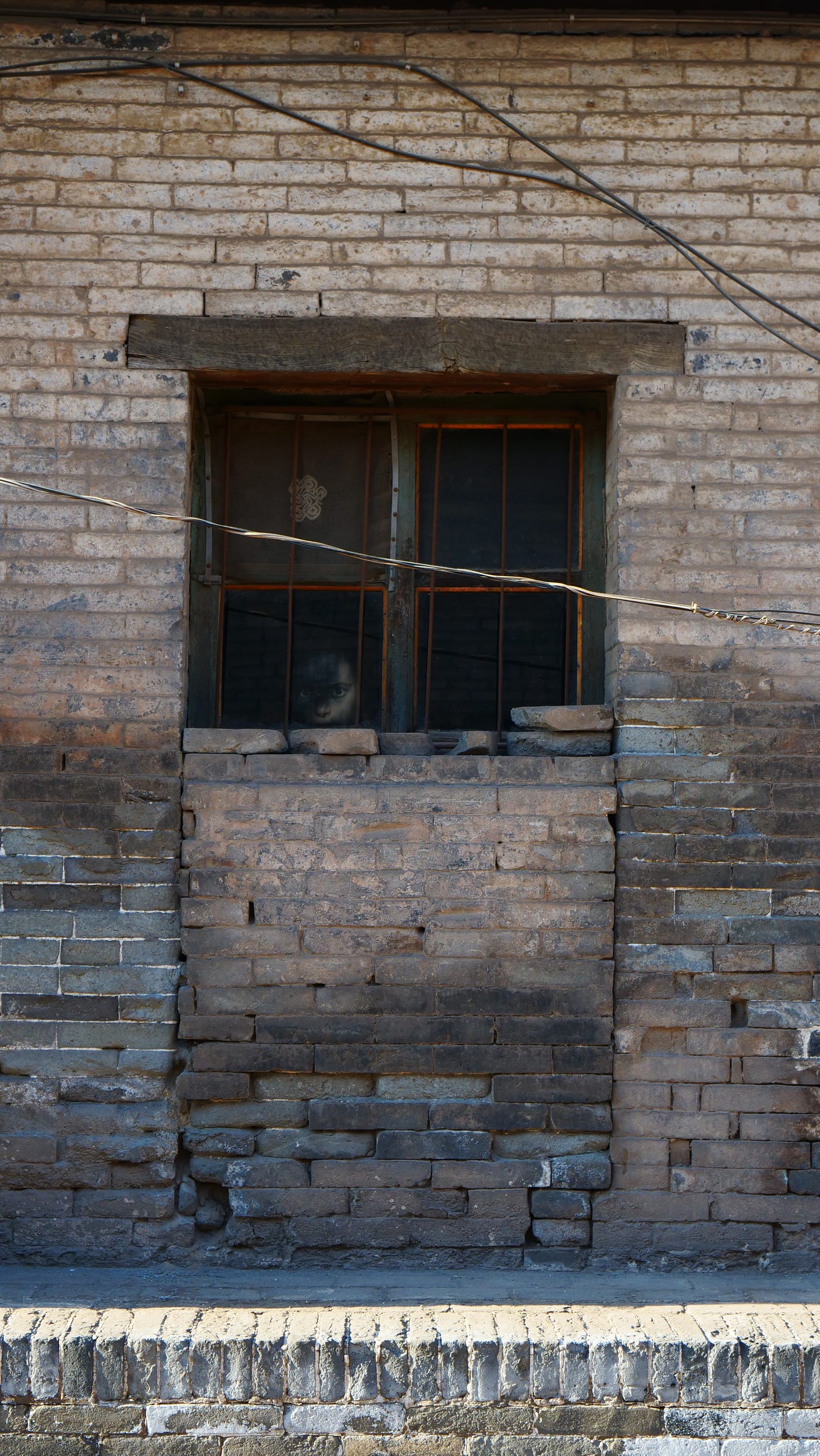
In the 1980s, at the age of youth,
WAKE: I was fortunate enough to be able to read some enlightening books in translation and to study art and film. The biographies and works of artists made me realise the importance of freedom and creativity, but also the fact that I was already ‘deaf, scared and autistic.’ From my early teens, I had to drink strong alcohol in order to be able to talk to people.
If I met a girl for company, I would make a spooky remark and drink to the point where the primitive impulse could not be brought down to the Ostrovsky dimension. If I did, I would at best imitate Pushkin's or Marx's youth by prostrating myself and kissing a girl's feet with a snotty kiss! (Taken from an earlier interview for a Chinese art journal.)
The fascination with the feet and the ritual of prostration comes from growing up with his grandmother, whose feet were bound. The entire history of foot binding complex; a book written by Lisa See, Snow Flower and the Secret Fan gives a Chinese woman’s point of view. For Wake, his grandmother, revered in him a need to see beyond the bondage, a reason for the hunt for natural and spontaneous female feet …
Many of Wake’s later performances involve prostration and kissing the foot, drinking from women’s shoes became my early performance art pieces. He created his famous 3-inch Golden Lotus Shoe Car which is symbolic, emblematic and satiric.
When I was young, my grandmother often sang a nursery rhyme to me to coax me to sleep. The only nursery rhyme she could sing was:
月亮奶奶[ai] Grandma Moon
好吃韭菜[ai] She likes to eat leeks
韭菜齁辣[a] The leeks are too spicy
好吃黄瓜[a] She likes to eat cucumber
黄瓜有种[ong] Cucumbers have seeds
好吃油饼[ing] She likes to eat oilcake
油饼喷香[ang] The oilcake is too fragrant
好喝面汤[ang] She likes to eat noodle soup
(The red ones are rhyme end, but I can’t express them in English.)
My mother can also sing this nursery rhyme.
As soon as I hear this song, I miss my grandma.
WAKE: In his book Chinese Action, Dongtai mountain man, Wen Pring concludes, "Most artists who engage in performance art have a strong sense of social responsibility, and their concerns are usually those shared by society as a whole, only they choose a more direct way of expressing themselves. In their actions you can experience their sense of responsibility, humanitarianism and love, as well as their critique of social ills, and you can also feel the novelty, excitement, revelation and imagination."
Best wishes,
WAKE. Dōngběi - China.
Thank you so much for coming by. I hope you enjoy Wakes’ work.
I finish this 3-part meeting with Li Wake, next time with Painting and Performance
If you enjoy this journal, please leave a comment or share.
Have a great next few weeks.






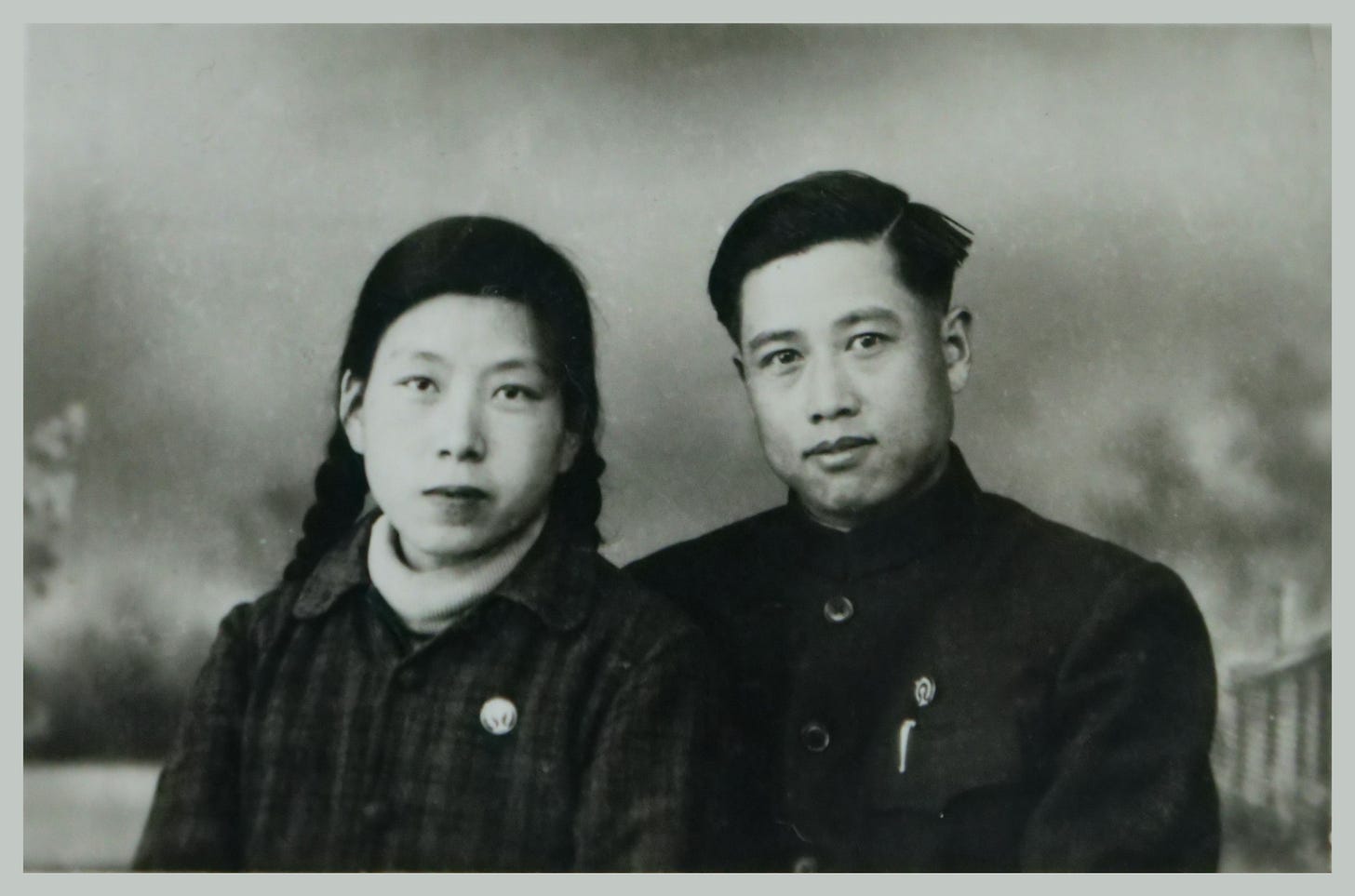


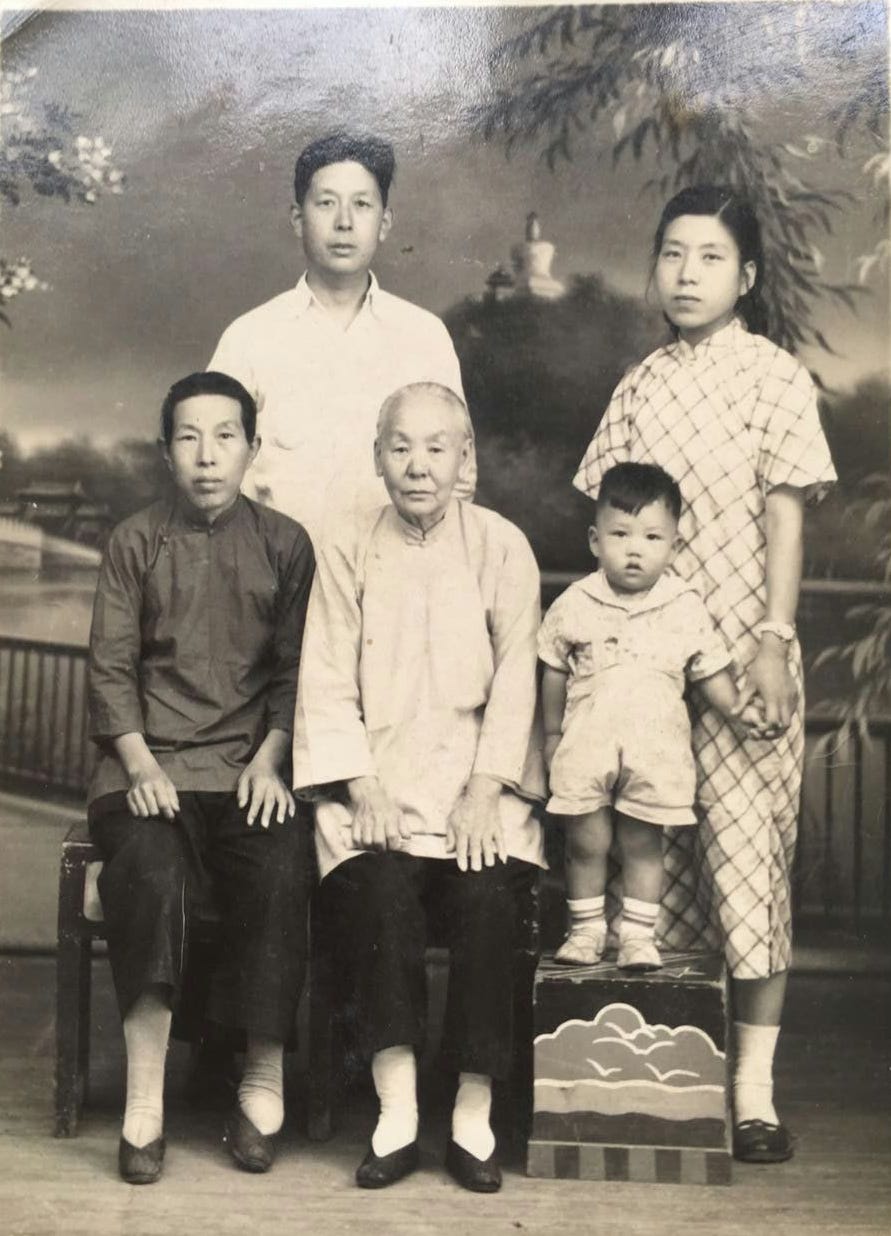
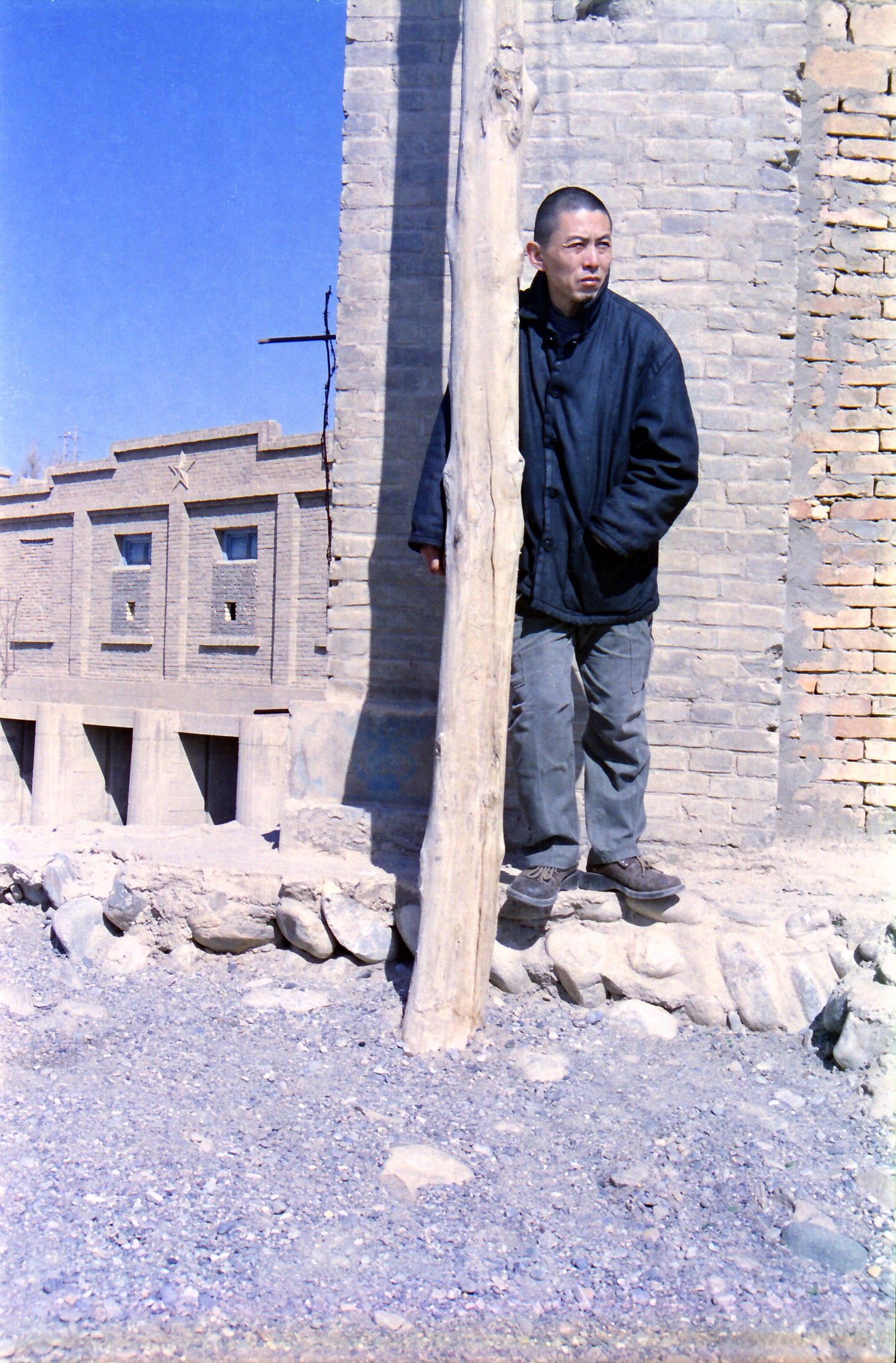

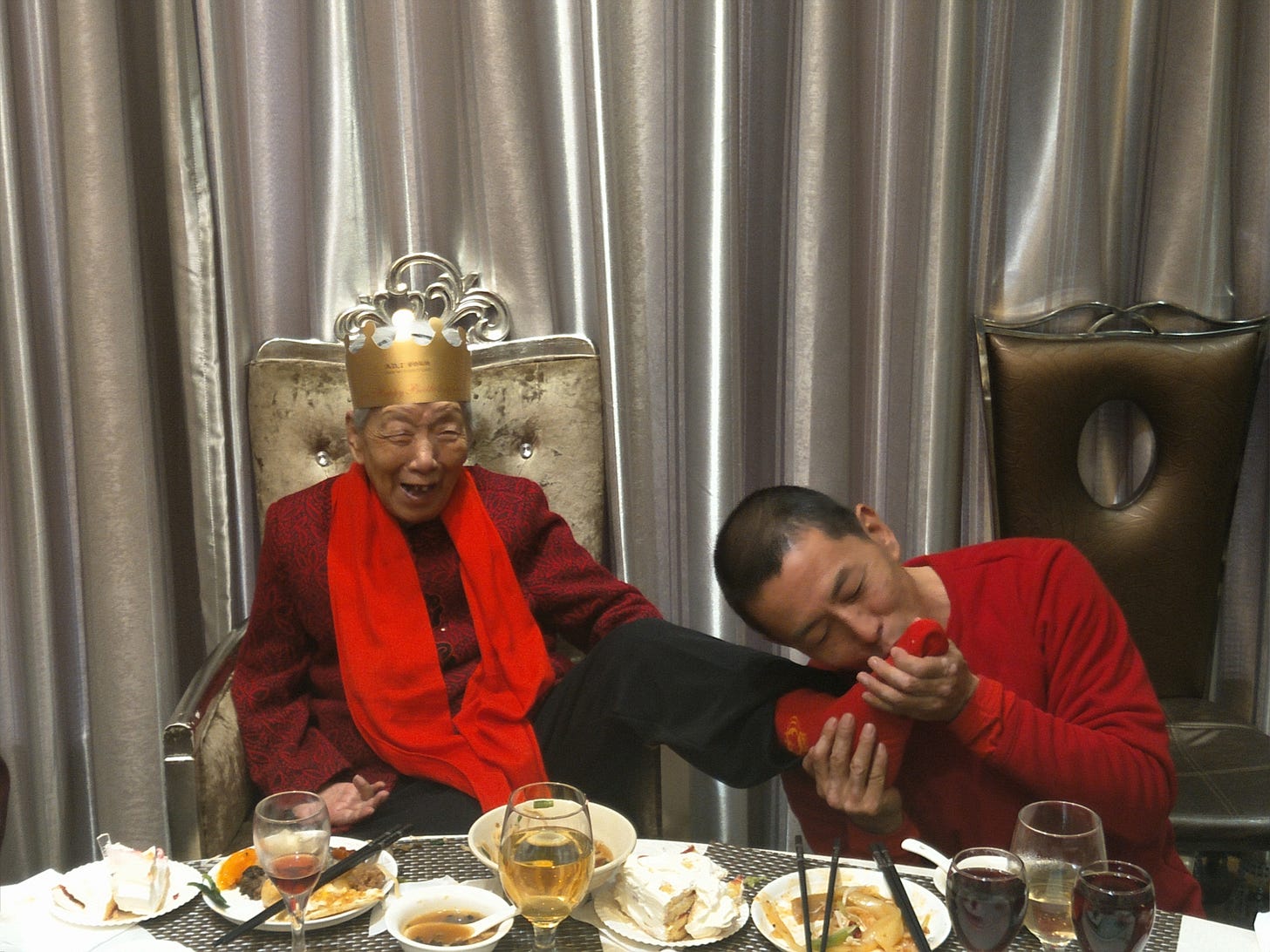


I am consumed with so many feelings.Thankyou for waking me up.I see what is going on in the world...but I am not always looking.My eyes have been opened
This is an upsetting, thoughtful and informative piece, full of insights about the artist as well as about the era that shaped him.